With a myriad of frightening side effects associated with some hair loss pharmaceutical drugs, some people are turning towards natural remedies for hair loss. One hotly discussed ingredient is turmeric. Below is a screenshot of a question that someone asked on an online forum. So, is turmeric good or bad of hair loss?

On one hand, turmeric is touted a natural superfood with anti-inflammatory, anti-microbial and immunomodulatory properties that can boost our health and perhaps even support hair growth. Unsurprisingly, turmeric is included in many hair growth supplements (partly because its great for marketing purposes).
On the other hand, we have a startling lack of clinical data supporting turmeric’s hair promoting effects. In fact, we even have some anecdotal evidence speaking against turmeric, such as Stanford professor Andrew Huberman who quoted “taking turmeric … I did not feel good. I mean, it crushed all sorts of positive feelings of vitality.”1
In this article, we’ll explore wether turmeric can help you in your journey to overcoming hair loss.
What is turmeric?
Turmeric is a vibrant yellow-orange spice derived from the root of the Curcuma longa plant, a member of the ginger family. It has been a staple in Asian cuisine and traditional medicine for thousands of years.
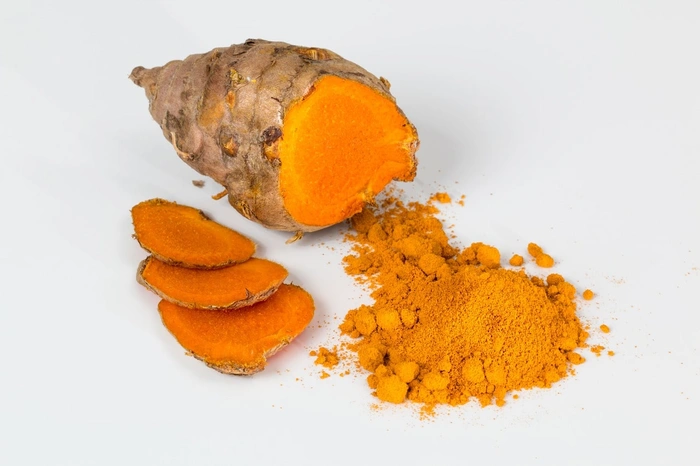
Its most active compound, curcumin, is celebrated for its powerful anti-inflammatory, antimicrobial, neuroprotective and antioxidant properties.
When ingested by itself, curcumin is not easily absorbed by the body. This is why supplements often mix turmeric with piperine (a compound food in black pepper) as this combination improves absorption and bioavailability in the body.
Turmeric tonic improves scalp health
A study investigated the effects of a turmeric tonic applied on the scalps of people with scalp psoriasis twice daily for 9 weeks. Turmeric tonic on the scalp significantly reduced the psoriasis and improved scalp health.
The study concluded that “Turmeric tonic appears to be an effective treatment in patients with mild-to-moderate scalp psoriasis. With treatment, patients experienced a significant decrease in erythema, thickness, and scaling of the scalp”.
No side effects were reported.
We know that psoriasis can negatively impact hair cycle regulation and contribute to telogen effluvium sheds.
Psoriasis is an immune-mediated, inflammatory skin condition. Curcumin has the ability to down-regulate the receptors of 5-LOX, COX-2, TNFa, IL-6, IL-8 and IL-1 cytokines, in order to reduce inflammation.
This supports the finding from another clinical study from 2000 investigation the effects if turmeric gel. That study reported that five of ten patients had 90% resolution of psoriasis after 2-6 weeks of treatment with curcumin gel, and the rest of the patients had 50%-85% improvement after 3-8 weeks of treatment.
Turmeric can therefore help lower scalp inflammation, restore scalp health and encourage healthy hair cycling and growth.
Turmeric: A DHT blocker?
It is vey well established that dihydrotestosterone (DHT) is a hormone that leads to hair follicle miniaturisation.
A petri dish study found that curcumin decreases DHT in prostate cancer cells in a dosage dependent manner. Curcumin elevated levels of AKR1C2, a protein involved in androgen metabolism. This helped reduce the presence of DHT.
200mg/kg of curcumin was also given to mice for 30 days. AKR1C2 protein expression was up-regulated and testosterone concentration decreased however, DHT remained unchanged.
Another study also found that turmeric inhibits 5 alpha-reductase in rat prostate tissue. 5 alpha-reductase is the enzyme that converts testosterone into dihydrotestosterone.
Given that these studies have not been conducted on human scalps, it would be a stretch to assume that this DHT-blocking ability would translate into hair growth promoting effects in a cosmetically significant way. We simply don’t have enough data to tell how much DHT turmeric can reduce.
Anecdotally, we have evidence from Andrew Huberman saying “Oh yeah, but I had reported my own anecdotal experience that taking turmeric really crushed my DHT levels and I did not feel good. I mean, it crushed all sorts of positive feelings of vitality.”
Turmeric for alopecia areata
A study took 60 patients with alopecia areata. 30 patients were given a topical lotion containing 0.1% piperine, 0.03% capsaicin, and 0.1% curcumin. The remaining 30 patients were given topical 5% minoxidil.
After 3 months, patients in both groups experienced great visual improvements.
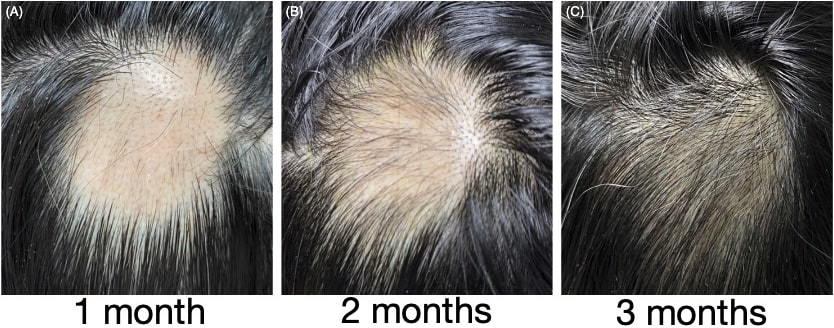
It is clear that the anti-inflammatory and immunomodulatory properties of curcumin can benefit people with inflammation-related hair loss such as alopecia areata.
Curcumin achieves this with its powerful ability to decrease the expression of pro-inflammatory cytokines and growth factors such as IL-6 and IL-8 in human keratinocytes.
Turmeric for stress-related shedding
Another study investigated the effect of turmeric on stress-related hair shedding. This study split a group of mice into 4 categories:
- Group 1: Control group. No treatment.
- Group 2: Negative control group. These mice received sonic stress but without any drug treatment.
- Group 3: Treatment of T. indica orally (300mg/kg) after sonic stress treatment
- Group 4: Treatment of C. longa (turmeric) orally (300mg/kg) after sonic stress treatment.
In groups 2, 3and 4, the mice were purposefully stressed out with sound stress emitted by a rodent repellant device. This device emitted sound at a frequency of 300 Hertz in intervals of 15 seconds. The stress device was placed into the mouse cage so that the mice could not escape sound perception.
After 20 days, the mice had their hair analysed and their blood tested.
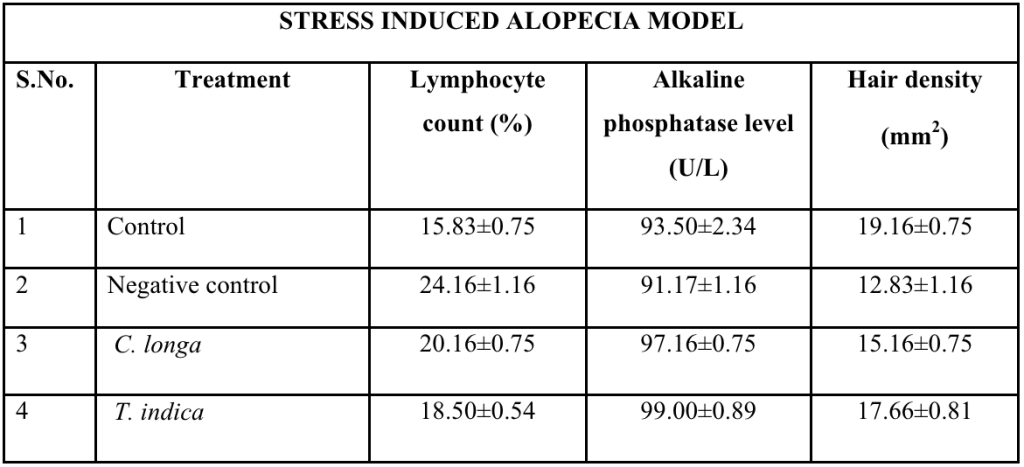
We can see that sonic stress induced a significant amount of reduction in hair density (due to a greater ratio if telogen hairs). Turmeric was able to partially recover the effects of stress-induced shedding.
The table below shows the percentage of hairs in each phase of the hair cycle after 20 days.
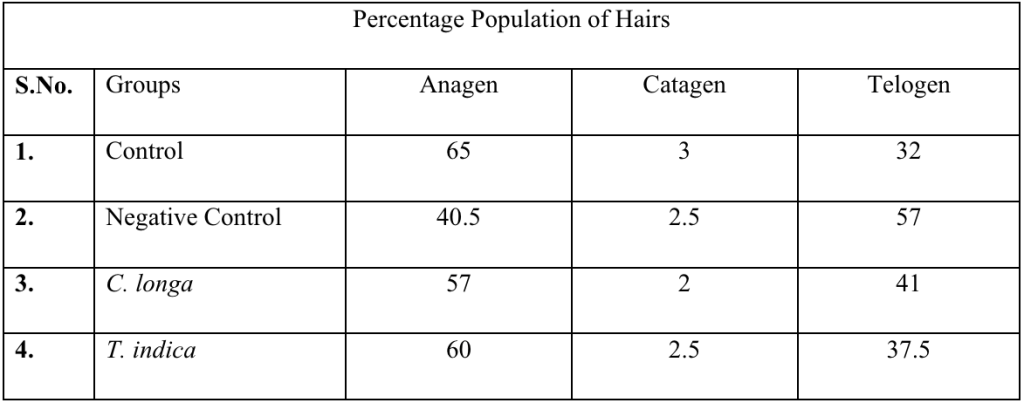
We can see that turmeric was able to partially alleviate the effects of stress-induced hair loss.
To state the obvious, mice are not humans. However, this study suggests that turmeric probably has some beneficial effects on stress-related shedding.
Problems with turmeric supplementation
Turmeric can exacerbate an iron deficiency
A study reports of a 66 year old physician who took 538mg of turmeric extract daily to help lower his inflammation. During this time, he experienced iron deficiency. It turns out that turmeric binds with iron in the gut, preventing its absorption. In this case study, iron deficiency resolved after the turmeric was stopped.
You may be thinking that 538mg per day is a ridiculous dosage that not many will take. Searching for ‘turmeric’ on Amazon shows some supplements making thousands of sales per month with much higher dosages!

Other side effects
Turmeric is generally considered safe. We can’t say what the upper dosage threshold is since we just don’t have enough data viable. Some sources suggest that at high enough concentration there may be some digestive side effects (bloating, acid reflux).
Inconsistency between sellers
The supplement market is the wild west. For starters, a lot of supplements don’t even have the ingredients the label claims they do. A study found that out of 30 supplements on Amazon, 17 had inaccurate labels, 13 were misbranded and 9 had additional ingredients detected that were not on the label.
Another study found that “a growing body of evidence indicating that turmeric containing excessive concentrations of lead is available for purchase in US grocery stores and that childhood lead-poisoning cases attributable to consumption of contaminated turmeric have occurred in the United States.”
Yet another study found that “40% of the 133 protein powder products they tested had elevated levels of heavy metals”.
Some powders may also contain questionable food colorants.
This is not to say that we should always avoid supplements. I simply encourage everyone to select high quality supplement vendors.
Parting thoughts
There is no doubt that turmeric boasts a number of health benefits. I myself often include it in my meals. Evidence shows that turmeric (specifically, curcumin) can support hair health.
Those with inflammatory or immune-related scalp conditions such as alopecia areata or psoriasis can greatly benefit from turmeric topical solutions. It is likely that turmeric can also help (but not completely reverse) with psycho-emotional stress related shedding.
When it comes to androgenic alopecia (pattern baldness), the evidence is very sparse. Sure, curcumin *may* lower your DHT levels, but the degree to which it does this is not known and is probably not sufficient to make a cosmetic difference to the look of your hair. Because of this, turmeric should NOT be use as a standalone treatment for pattern baldness.
If you choose to purchase a turmeric topical or supplement, products with curcumin rather than turmeric will provide a more concentrated, potent dosage.
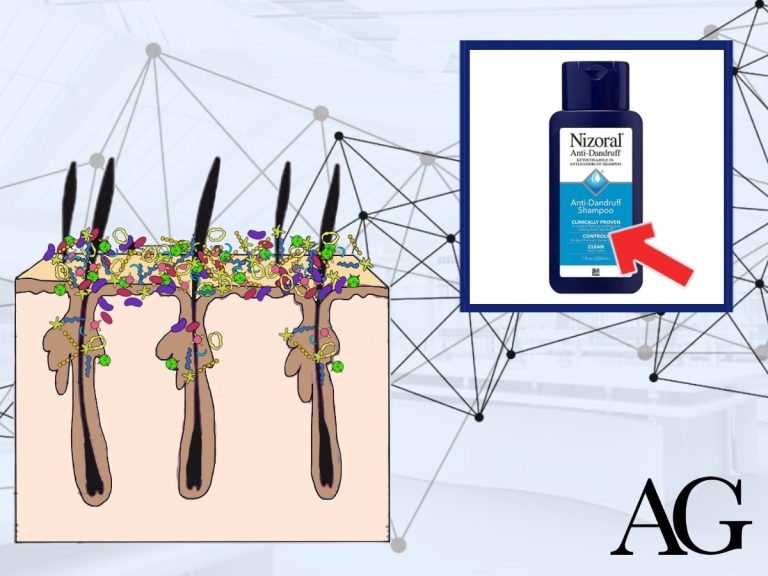

I learned something new today. Thanks